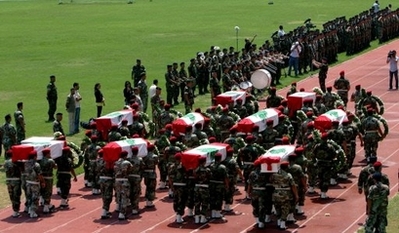 TRIPOLI, Lebanon (AFP) – The Lebanese army on Thursday held an emotional ceremony for nine soldiers who were among 14 people killed in a bomb attack the previous day that targeted the military in northern Lebanon. But even as the ceremony was underway in the tense northern city of Tripoli a man was shot and wounded near flashpoint neighbourhoods where 23 people were killed in sectarian fighting in June and July, a police official said. Thunderous applause broke out as nine coffins draped in Lebanese flags were carried shoulder high by comrades of the dead soldiers into a sports stadium in the port city. Another group of soldiers carrying wreath composed of white, red and green flowers — the colours of the Lebanese flag — preceded the pall-bearers into the stadium.Interior Minister Ziad Baroud and acting army chief Shawki al-Masri attended the ceremony alongside relatives and friends of the soldiers, who wept as the coffins were brought into the stadium to a full military salute. The soldiers aged between 21 and 32 were killed when a bomb hidden in a bag exploded near a bus stop during morning rush hour on Wednesday. A shoeshine boy was among the five other civilians killed in the attack. The attack was the deadliest in the troubled country in three years and came only hours before President Michel Sleiman, the former army chief, was due to begin a visit to neighbouring Syria to launch first ever diplomatic ties. President Suleiman held a meeting with security officials in the presence of Defense, Interior and Finance minister to direct the investigation. Forty people were also injured in the attack. Masri denounced what he called "cowardly terrorism which targets the Lebanese army" and said that the attack "will not deter the army from its duty to defend the nation." Shawki has been at the helm of the army since Sleiman was elected president on May 25, after rival politicians reached a power-sharing agreement in the Qatari capital of Doha to end 18 months of political crisis. Prime Minister Fuad Siniora, whose recently-formed cabinet was confirmed by parliament just a day before the attack, called for three days of mourning across Lebanon from Thursday. Siniora had also called for a one-hour work-stoppage across the country at midday Thursday. The call was heeded throughout Tripoli where residents also observed five minutes of silence at the request of the prime minister, while black flags decked Lebanon’s second city in sign of mourning. Funerals for the soldiers will be held privately.
TRIPOLI, Lebanon (AFP) – The Lebanese army on Thursday held an emotional ceremony for nine soldiers who were among 14 people killed in a bomb attack the previous day that targeted the military in northern Lebanon. But even as the ceremony was underway in the tense northern city of Tripoli a man was shot and wounded near flashpoint neighbourhoods where 23 people were killed in sectarian fighting in June and July, a police official said. Thunderous applause broke out as nine coffins draped in Lebanese flags were carried shoulder high by comrades of the dead soldiers into a sports stadium in the port city. Another group of soldiers carrying wreath composed of white, red and green flowers — the colours of the Lebanese flag — preceded the pall-bearers into the stadium.Interior Minister Ziad Baroud and acting army chief Shawki al-Masri attended the ceremony alongside relatives and friends of the soldiers, who wept as the coffins were brought into the stadium to a full military salute. The soldiers aged between 21 and 32 were killed when a bomb hidden in a bag exploded near a bus stop during morning rush hour on Wednesday. A shoeshine boy was among the five other civilians killed in the attack. The attack was the deadliest in the troubled country in three years and came only hours before President Michel Sleiman, the former army chief, was due to begin a visit to neighbouring Syria to launch first ever diplomatic ties. President Suleiman held a meeting with security officials in the presence of Defense, Interior and Finance minister to direct the investigation. Forty people were also injured in the attack. Masri denounced what he called "cowardly terrorism which targets the Lebanese army" and said that the attack "will not deter the army from its duty to defend the nation." Shawki has been at the helm of the army since Sleiman was elected president on May 25, after rival politicians reached a power-sharing agreement in the Qatari capital of Doha to end 18 months of political crisis. Prime Minister Fuad Siniora, whose recently-formed cabinet was confirmed by parliament just a day before the attack, called for three days of mourning across Lebanon from Thursday. Siniora had also called for a one-hour work-stoppage across the country at midday Thursday. The call was heeded throughout Tripoli where residents also observed five minutes of silence at the request of the prime minister, while black flags decked Lebanon’s second city in sign of mourning. Funerals for the soldiers will be held privately.
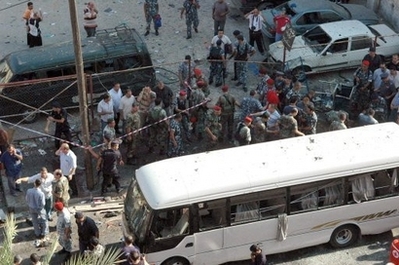 By Nazih Siddiq , TRIPOLI, Lebanon (Reuters) – A bomb killed at least 14 people, including nine soldiers, at a bus stop in the northern Lebanese city of Tripoli on Wednesday, security sources said. The bomb, which also wounded at least 45 people, was the deadliest attack on the army since its battle with al Qaeda-inspired Islamist militants in the north last year. It had been placed in a bag at the bus stop where soldiers usually gather, the army said in a statement, describing the attack as a "terrorist bombing" — a phrase used in the past by the military when it suspects militant Islamist involvement. The army put the initial death toll at 11 but other medical and security sources said it had risen as casualties died from their wounds. The blast struck at 7.45 a.m. (5:45 a.m. British time) as people made their way to work. Red Cross workers ferried casualties to hospital. The ground was spattered with blood and covered in shards of glass, television pictures showed. There were no immediate claims of responsibility for the attack in Lebanon’s second largest city, which has been the scene of fighting between security forces and Islamist militants and sectarian violence linked to political tension in Lebanon. "The army and security forces will not yield to attempts to terrorise them with attacks and crimes," said President Michel Suleiman, who had been army chief until his election in May.
By Nazih Siddiq , TRIPOLI, Lebanon (Reuters) – A bomb killed at least 14 people, including nine soldiers, at a bus stop in the northern Lebanese city of Tripoli on Wednesday, security sources said. The bomb, which also wounded at least 45 people, was the deadliest attack on the army since its battle with al Qaeda-inspired Islamist militants in the north last year. It had been placed in a bag at the bus stop where soldiers usually gather, the army said in a statement, describing the attack as a "terrorist bombing" — a phrase used in the past by the military when it suspects militant Islamist involvement. The army put the initial death toll at 11 but other medical and security sources said it had risen as casualties died from their wounds. The blast struck at 7.45 a.m. (5:45 a.m. British time) as people made their way to work. Red Cross workers ferried casualties to hospital. The ground was spattered with blood and covered in shards of glass, television pictures showed. There were no immediate claims of responsibility for the attack in Lebanon’s second largest city, which has been the scene of fighting between security forces and Islamist militants and sectarian violence linked to political tension in Lebanon. "The army and security forces will not yield to attempts to terrorise them with attacks and crimes," said President Michel Suleiman, who had been army chief until his election in May.
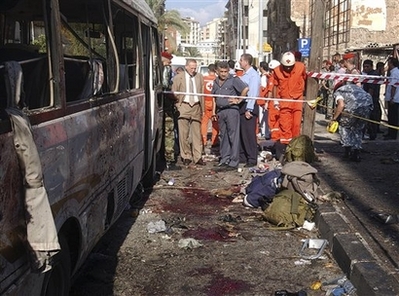 (AFP) by Omar Ibrahim, A child who was polishing shoes on the street was among the 14 dead, the official said, adding that nine of those killed and many of the wounded were soldiers. "My son! My son!," screamed one mother striking her chest at a Tripoli hospital after learning that her 22-year-old soldier son was dead. It was the deadliest attack on the army since a 15-week battle last year the Al-Qaeda inspired Fatah al-Islam militia in an impoverished Palestinian refugee camp near Tripoli that left 400 people dead, including 168 soldiers. The army said the bomb was planted in a bag at a military gathering point in the Masarif Street commercial district of Tripoli and exploded near a public bus carrying soldiers from the northern region of Akkar. "The terrorist explosion directly targets the army and peaceful co-existence in the country," it said in a statement. The attack also came just a day after a national unity government formed by Prime Minister Fuad Siniora following 18 months of deadly tensions with the Hezbollah-led opposition finally won a vote of confidence in parliament. The crisis had pushed the country to the brink of a new civil war and was only ended by an Arab-brokered power-sharing agreement in May.
(AFP) by Omar Ibrahim, A child who was polishing shoes on the street was among the 14 dead, the official said, adding that nine of those killed and many of the wounded were soldiers. "My son! My son!," screamed one mother striking her chest at a Tripoli hospital after learning that her 22-year-old soldier son was dead. It was the deadliest attack on the army since a 15-week battle last year the Al-Qaeda inspired Fatah al-Islam militia in an impoverished Palestinian refugee camp near Tripoli that left 400 people dead, including 168 soldiers. The army said the bomb was planted in a bag at a military gathering point in the Masarif Street commercial district of Tripoli and exploded near a public bus carrying soldiers from the northern region of Akkar. "The terrorist explosion directly targets the army and peaceful co-existence in the country," it said in a statement. The attack also came just a day after a national unity government formed by Prime Minister Fuad Siniora following 18 months of deadly tensions with the Hezbollah-led opposition finally won a vote of confidence in parliament. The crisis had pushed the country to the brink of a new civil war and was only ended by an Arab-brokered power-sharing agreement in May.
 Sleiman, who was army chief until his election as president by MPs in May, condemned what he called a "terrorist crime," a sentiment echoed by Syria. "The army and security forces will not be terrorised by attacks and crimes that target it and civil society, and the history of the army attests to that," Sleiman said in a statement. The security official said the bomb was packed with 20 kilogrammes (44 pounds) of explosives, and the force of the blast blew the remains of some of the dead on to the roofs of nearby buildings. The Mediterranean port city has been rocked by deadly violence between anti-Syrian supporters Siniora and his Damascus-backed rivals amid a long-running political crisis. In Tripoli, desperate families gathered at four hospitals to check on the fate of their loved ones but were blocked by security from entering. One hospital official said identification was delayed because some bodies were mutilated beyond recognition. "The hands of the criminals have hit in Tripoli," said Information Minister Tareq Mitri. "The investigation has begun and there are many interpretations, political interpretations."
Sleiman, who was army chief until his election as president by MPs in May, condemned what he called a "terrorist crime," a sentiment echoed by Syria. "The army and security forces will not be terrorised by attacks and crimes that target it and civil society, and the history of the army attests to that," Sleiman said in a statement. The security official said the bomb was packed with 20 kilogrammes (44 pounds) of explosives, and the force of the blast blew the remains of some of the dead on to the roofs of nearby buildings. The Mediterranean port city has been rocked by deadly violence between anti-Syrian supporters Siniora and his Damascus-backed rivals amid a long-running political crisis. In Tripoli, desperate families gathered at four hospitals to check on the fate of their loved ones but were blocked by security from entering. One hospital official said identification was delayed because some bodies were mutilated beyond recognition. "The hands of the criminals have hit in Tripoli," said Information Minister Tareq Mitri. "The investigation has begun and there are many interpretations, political interpretations."
 Daily Star – BEIRUT: Lebanese President Michel Sleiman and newly appointed commander of the Lebanese Armed Forces General Jean Kahwaji offered condolences on Saturday to the family of First Lieutenant Samer Hanna, who was killed when his helicopter was hit by Hizbullah gunfire on Thursday. Hanna’s helicopter was shot at during a training session in the Sejod Hills in Southern Lebanon, a region known to be a Hizbullah stronghold. Sleiman and Kahwaji paid separate visits to Hanna’s family at their residence in the northern town of Tannourine. The army officer was laid to rest on Friday. Meanwhile, judicial authorities on Saturday continued to investigate the Thursday’s incident after Hizbullah handed over the assailant and said that the incident had been the result of "confusion."
Daily Star – BEIRUT: Lebanese President Michel Sleiman and newly appointed commander of the Lebanese Armed Forces General Jean Kahwaji offered condolences on Saturday to the family of First Lieutenant Samer Hanna, who was killed when his helicopter was hit by Hizbullah gunfire on Thursday. Hanna’s helicopter was shot at during a training session in the Sejod Hills in Southern Lebanon, a region known to be a Hizbullah stronghold. Sleiman and Kahwaji paid separate visits to Hanna’s family at their residence in the northern town of Tannourine. The army officer was laid to rest on Friday. Meanwhile, judicial authorities on Saturday continued to investigate the Thursday’s incident after Hizbullah handed over the assailant and said that the incident had been the result of "confusion." 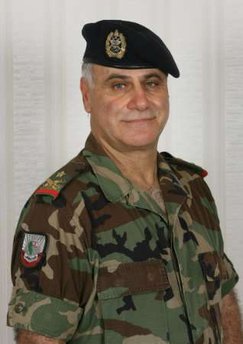 The new chief of the Lebanese army, Jean Kahwaji, has been promoted to general in a ceremony attended by his predecessor, President Michel Suleiman. Gen Kahwaji was appointed to the post at a meeting of the national unity government on Friday evening. The 54-year-old Maronite Christian had been a brigade commander since 2002. Many Lebanese regard the army as one of the country’s few neutral institutions, and say it plays an important role in preventing sectarian conflict.
The new chief of the Lebanese army, Jean Kahwaji, has been promoted to general in a ceremony attended by his predecessor, President Michel Suleiman. Gen Kahwaji was appointed to the post at a meeting of the national unity government on Friday evening. The 54-year-old Maronite Christian had been a brigade commander since 2002. Many Lebanese regard the army as one of the country’s few neutral institutions, and say it plays an important role in preventing sectarian conflict. 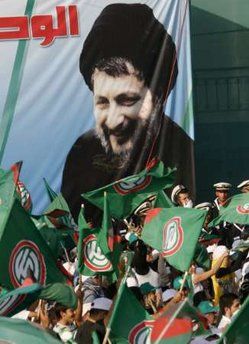 BEIRUT (AFP) – Several thousand people joined a rally in
BEIRUT (AFP) – Several thousand people joined a rally in  Sunday marked 30 years since the disappearance of Imam Musa al-Sadr, a Lebanese icon who put his country’s Shiite community on the road to sociopolitical revival long before the 1979 Islamic Revolution In Iran brought a more radical flavor to the phenomenon on the regional level. The details of Sadr’s fate remain a mystery, but all signs point to the government of Libya, which is the last place where he was seen alive. Tripoli has staunchly – but not very convincingly – denied any involvement, preventing the two countries from improving their bilateral relationship and foiling any form of "closure" to many Lebanese Shiites who still believe that their hero continues to languish in captivity. As it happens, the anniversary followed just a day after visiting Italian Prime Minister Silvio Berlusconi performed a remarkable act of contrition in Benghazi, apologizing to all Libyans for his own country’s colonial-era atrocities and pledging billions of dollars in investment as a mechanism of indirect compensation. But Moammar Gadhafi’s regime need not look to Rome for an example of how to properly turn the page: In the past few years, his own government has closed several embarrassing files, including its efforts to develop weapons of mass destruction and the involvement of its intelligence officers in the 1988 Lockerbie airliner bombing. Sayyed Hassan Nasrallah, leader of Hizbullah, has invited the Libyans to come clean on Sadr’s disappearance as well, and Tripoli could do itself a favor by accepting it. As demonstrated by last week’s filing of charges against Gadhafi by a Lebanese prosecutor, this issue will not go away – particularly when Hizbullah and Amal, two Shiite parties that form a large part of Sadr’s legacy, remain in ascendance.
Sunday marked 30 years since the disappearance of Imam Musa al-Sadr, a Lebanese icon who put his country’s Shiite community on the road to sociopolitical revival long before the 1979 Islamic Revolution In Iran brought a more radical flavor to the phenomenon on the regional level. The details of Sadr’s fate remain a mystery, but all signs point to the government of Libya, which is the last place where he was seen alive. Tripoli has staunchly – but not very convincingly – denied any involvement, preventing the two countries from improving their bilateral relationship and foiling any form of "closure" to many Lebanese Shiites who still believe that their hero continues to languish in captivity. As it happens, the anniversary followed just a day after visiting Italian Prime Minister Silvio Berlusconi performed a remarkable act of contrition in Benghazi, apologizing to all Libyans for his own country’s colonial-era atrocities and pledging billions of dollars in investment as a mechanism of indirect compensation. But Moammar Gadhafi’s regime need not look to Rome for an example of how to properly turn the page: In the past few years, his own government has closed several embarrassing files, including its efforts to develop weapons of mass destruction and the involvement of its intelligence officers in the 1988 Lockerbie airliner bombing. Sayyed Hassan Nasrallah, leader of Hizbullah, has invited the Libyans to come clean on Sadr’s disappearance as well, and Tripoli could do itself a favor by accepting it. As demonstrated by last week’s filing of charges against Gadhafi by a Lebanese prosecutor, this issue will not go away – particularly when Hizbullah and Amal, two Shiite parties that form a large part of Sadr’s legacy, remain in ascendance. TYRE, Lebanon (Reuters) – Many of the 44 teams clearing cluster munitions scattered by
TYRE, Lebanon (Reuters) – Many of the 44 teams clearing cluster munitions scattered by  TRIPOLI, Lebanon (AFP) – The Lebanese army on Thursday held an emotional ceremony for nine soldiers who were among 14 people killed in a bomb attack the previous day that targeted the military in northern Lebanon. But even as the ceremony was underway in the tense northern city of
TRIPOLI, Lebanon (AFP) – The Lebanese army on Thursday held an emotional ceremony for nine soldiers who were among 14 people killed in a bomb attack the previous day that targeted the military in northern Lebanon. But even as the ceremony was underway in the tense northern city of  By Nazih Siddiq , TRIPOLI, Lebanon (Reuters) – A bomb killed at least 14 people, including nine soldiers, at a bus stop in the northern Lebanese city of Tripoli on Wednesday, security sources said. The bomb, which also wounded at least 45 people, was the deadliest attack on the army since its battle with al Qaeda-inspired Islamist militants in the north last year. It had been placed in a bag at the bus stop where soldiers usually gather, the army said in a statement, describing the attack as a "terrorist bombing" — a phrase used in the past by the military when it suspects militant Islamist involvement. The army put the initial death toll at 11 but other medical and security sources said it had risen as casualties died from their wounds. The blast struck at 7.45 a.m. (5:45 a.m. British time) as people made their way to work. Red Cross workers ferried casualties to hospital. The ground was spattered with blood and covered in shards of glass, television pictures showed. There were no immediate claims of responsibility for the attack in Lebanon’s second largest city, which has been the scene of fighting between security forces and Islamist militants and sectarian violence linked to political tension in Lebanon. "The army and security forces will not yield to attempts to terrorise them with attacks and crimes," said President Michel Suleiman, who had been army chief until his election in May.
By Nazih Siddiq , TRIPOLI, Lebanon (Reuters) – A bomb killed at least 14 people, including nine soldiers, at a bus stop in the northern Lebanese city of Tripoli on Wednesday, security sources said. The bomb, which also wounded at least 45 people, was the deadliest attack on the army since its battle with al Qaeda-inspired Islamist militants in the north last year. It had been placed in a bag at the bus stop where soldiers usually gather, the army said in a statement, describing the attack as a "terrorist bombing" — a phrase used in the past by the military when it suspects militant Islamist involvement. The army put the initial death toll at 11 but other medical and security sources said it had risen as casualties died from their wounds. The blast struck at 7.45 a.m. (5:45 a.m. British time) as people made their way to work. Red Cross workers ferried casualties to hospital. The ground was spattered with blood and covered in shards of glass, television pictures showed. There were no immediate claims of responsibility for the attack in Lebanon’s second largest city, which has been the scene of fighting between security forces and Islamist militants and sectarian violence linked to political tension in Lebanon. "The army and security forces will not yield to attempts to terrorise them with attacks and crimes," said President Michel Suleiman, who had been army chief until his election in May. (AFP) by Omar Ibrahim, A child who was polishing shoes on the street was among the 14 dead, the official said, adding that nine of those killed and many of the wounded were soldiers. "My son! My son!," screamed one mother striking her chest at a Tripoli hospital after learning that her 22-year-old soldier son was dead. It was the deadliest attack on the army since a 15-week battle last year the
(AFP) by Omar Ibrahim, A child who was polishing shoes on the street was among the 14 dead, the official said, adding that nine of those killed and many of the wounded were soldiers. "My son! My son!," screamed one mother striking her chest at a Tripoli hospital after learning that her 22-year-old soldier son was dead. It was the deadliest attack on the army since a 15-week battle last year the  Sleiman, who was army chief until his election as president by MPs in May, condemned what he called a "terrorist crime," a sentiment echoed by
Sleiman, who was army chief until his election as president by MPs in May, condemned what he called a "terrorist crime," a sentiment echoed by 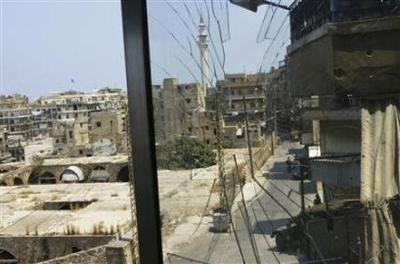 By Tom Perry , TRIPOLI (Reuters) – In
By Tom Perry , TRIPOLI (Reuters) – In 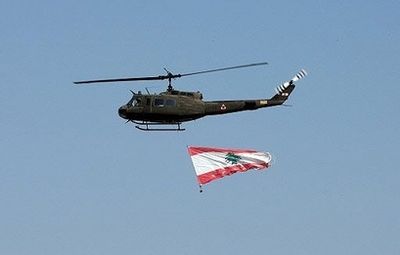 By Hussein Abdallah, BEIRUT: The ministerial committee in charge of drafting the new government’s platform finally thrashed out a policy statement late Friday, with the council of ministers expected to ratify the draft on Monday before presenting it to Parliament later next week. Information Minister Tarek Mitri walked out of the committee’s 14th and final meeting to tell reporters at the Grand Serail that the committee has finally reached an agreement over the ministerial statement despite some reservations by Minister of State Nassib Lahoud. Mitri said that the reservations, which were later clarified by Lahoud, would hopefully be dropped after further consultations between the ministers and Prime Minister Fouad Siniora ahead of an expected cabinet session on Monday.
By Hussein Abdallah, BEIRUT: The ministerial committee in charge of drafting the new government’s platform finally thrashed out a policy statement late Friday, with the council of ministers expected to ratify the draft on Monday before presenting it to Parliament later next week. Information Minister Tarek Mitri walked out of the committee’s 14th and final meeting to tell reporters at the Grand Serail that the committee has finally reached an agreement over the ministerial statement despite some reservations by Minister of State Nassib Lahoud. Mitri said that the reservations, which were later clarified by Lahoud, would hopefully be dropped after further consultations between the ministers and Prime Minister Fouad Siniora ahead of an expected cabinet session on Monday.